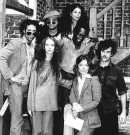 After recently reading the oral biography of Chris Farley, I turned to Live From New York, a bulky oral history of the show that made Farley famous. It reads about as quickly as a 600-page book can, full as it is of gossipy anecdotes.
After recently reading the oral biography of Chris Farley, I turned to Live From New York, a bulky oral history of the show that made Farley famous. It reads about as quickly as a 600-page book can, full as it is of gossipy anecdotes.
The basic arc is as you would expect, from the drug-saturated, world-conquering early days (production assistant Neil Levy: “This pot was from Africa or something. You didn’t even have to smoke it; you just looked at the joint and you were unconscious.”) to the squeakier professional days of Tina Fey, et al. Part of the fun, of course, is the character assassination. Chevy Chase and Harry Shearer come off as the most universally disliked. (NBC bigwig Dick Ebersol on Shearer: “He’s just a nightmare-to-deal-with person.” And writer James Downey: “[Bill] Murray can be a real asshole, but the thing that keeps bringing me back to defend him is I’ve seen him be an asshole to people who could affect his career way more often than to people who couldn’t. Harry Shearer will shit on you to the precise degree that it’s cost-free; he’s a total ass-kisser with important people.”)
I fell in love with Jane Curtin while reading the book. During the insane early days, she would always shake her head at the partying and go home to her husband and dog. This seemed paradoxically hardcore.
The book is full of digressions about things I either didn’t expect to see or didn’t expect to care about, like the ways in which Billy Crystal was a great colleague, the differences between writing for SNL and Letterman, and why Larry David didn’t succeed during a stint as a staff writer.
There’s a ton about Lorne Michaels, who offered a lot of material himself, and who comes off as funny, committed, intentionally enigmatic, and either a dream or a nightmare to work for, depending on your temperament. He was surprisingly OK with Sinead O’Connor’s notorious tearing in half of the Pope’s picture, citing her bravery. (The story of how O’Connor duped the producers into the moment is also a good one.) After a discussion of Janeane Garofalo’s dissatisfaction while on the show, Michaels offers a brief quote that doesn’t even name her: “Some people, their whole lives, are just injustice collectors. They’re going to find new injustices every day. That’s what they do, and that’s what they are.”
If you’re between heady books, I recommend this one as a palate cleanser. The same authors have just published an even thicker oral history of ESPN, which I’m sure I’ll get to at some point. The sports network’s glory days are even more clearly behind it than SNL’s, but such things hardly seem to matter in this format — I found myself flipping the pages just as quickly in the Victoria Jackson era as in the Gilda Radner era. (Everyone loved Gilda, by the way.)

